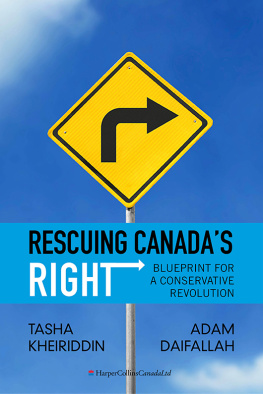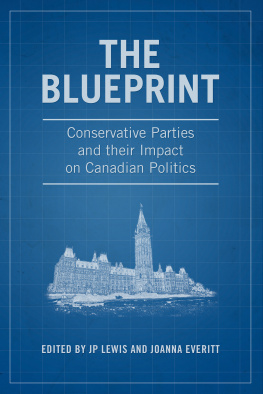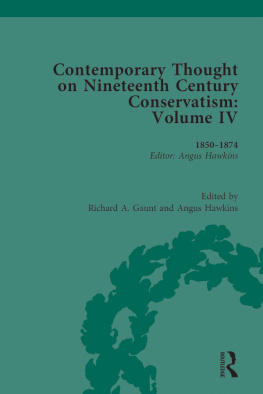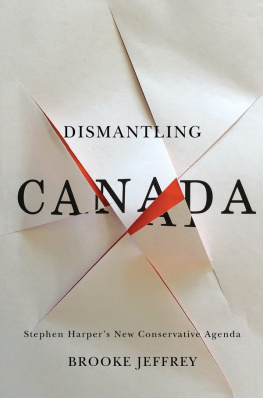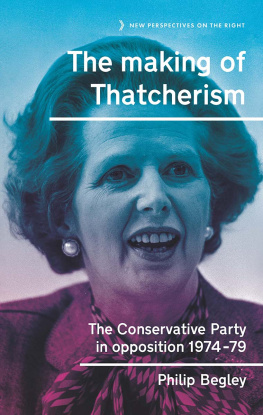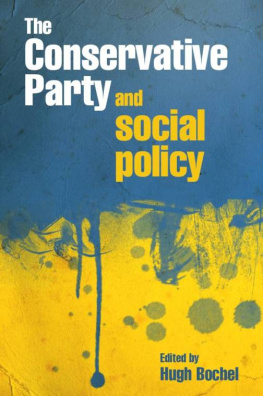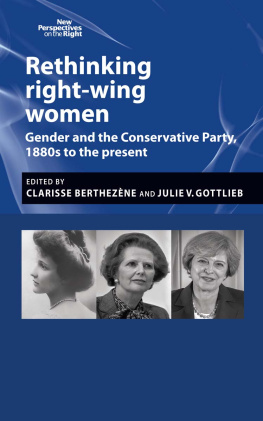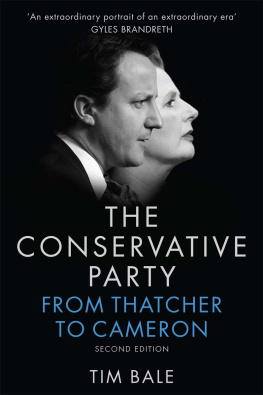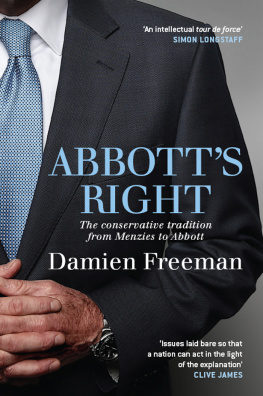If you are trying to change the world, you better be willing to take a few risks.
Michael Walker, founder of the Fraser Institute
Proclaiming oneself a conservative in Canada today is (check one):
a. unusual
b. a lonely endeavour
c. political suicide
d. all of the above
Unfortunately, in most parts of the country the answer is d. North of the forty-ninth parallel, the word conservative has become as much of an epithet as liberal has in the United States. The latter was no small feat, mind you. It took years of stigmatizing the causes and ideas of the Left by the well-funded American Right, along with the immensely successful presidency and personal popularity of Ronald Reagan, to make liberal a dirty word. In the 2004 election President Bush didnt even need to invent a synonymhe simply called Kerry a liberal innumerable times, especially in campaign ads.
In most parts of Canada, its the reverse. Out yourself as a conservative at many a Toronto cocktail party and you can feel the air suddenly grow thinner, as if youre being sucked into a giant social vacuum tube. Otherwise sensible people will exhibit one of two reactions: either back away and make for the bar, or start berating you for taking bread from the mouths of single mothers. Which is enough to make you need a drink too, or contemplate moving to Calgary. Either way, both temperatures and liquor consumption rise, with the conservative no further ahead in advancing his or her ideas.
Theories abound as to why conservatism has failed to make a significant impact in Canadian federal politics. Some say the general Canadian attitude of mind, as a whole, is not now, and has never been, conservative. Others claim the resources available to conservatives here, in terms of financial and human capital, rank far below those in the United States. Others point to Canadians obsession with the national unity issue, and the Conservative Partys failure to gain ground in Quebec.
In fact, much of the blame for the state of the right lies on conservatives own doorsteps. Throughout their history, Canadas federal conservative parties have failed to develop a coherent ideology, to build an infrastructure to support and market that ideology and to provide inspiring leadership. They have also failed at another key task: making conservatism cool. In an article entitled Conservative Cool, published in June 2005, Rick Petersen, founder of the Vancouver-based Conservative Council, laments that the party is going nowhere fast, and could remain stuck in a rut leading over a cliff, and that [i]n our biggest cities, Conservatives have an image problem, especially with women and younger voters.
No kidding, Rick! Since fashion-forward Belinda Stronach swanned across the floor to the Liberals in May 2005, the partys already tepid coolness quotient has plummeted to Hadean depths. Name a cool conservative. We defy you. Peter MacKay briefly flirted with coolness by dating Stronach; Rahim Jaffer, one of the few Tories with any semblance of fashion sense, can be spotted at establishments that pass for cool nightclubs in Ottawa. Sadly, these shining Armani moments are quickly cancelled out by persistent memories of Stephen Harper sporting a too-tight golf shirt and Ken doll haircut, and then defiantly proclaiming that he doesnt believe in makeovers.
Unfortunately for conservatives, the epitome of political cool in this country remains the late Prime Minister Pierre Elliott Trudeau. Trudeau wore sandals, told the separatists where to shove it, did a pirouette behind the Queens back and dated Barbra Streisand when she was at the top of her game. Trudeau is etched in an entire generation of Canadians minds as the ultimate politician, and is the closest thing Canadian public life has ever had to a rock star.
But Trudeau is history, you say? Not so fast. His Trudeauvian coolness has been reincarnated in sons Justin and Alexandre, who have graced innumerable magazine covers despite the fact that by their early 30s their collective works span a couple of films and documentaries, a spread in Macleansand a nice eulogy. As we write this, you can bet the Liberals are preparing to anoint one or the other prime minister in the next decade.
More significantly, the policies put in place by their father continue to shape Canadian society in almost every way. Trudeaus quest to fight Quebec separatism and impose his vision of a Just Society produced a country where government is so deeply embedded in our lives that, in the words of political scientist Alan Cairns, Our very identities are transformed The public and the private are intertwined.
As a result, Canadas political status quo is not liberal, conservative, right-wing or even classical liberalit is statist. Statism, as defined by the Acton Institute, is a program or viewpoint that looks to the state for resolution of social and moral problems, rather than to individual effort. Specifically, a condition where the nongovernmental institutions of a society develop an overextended and unhealthy reliance upon political structures for the solution of problems.
The Perils of Statism
Statism is anathema to conservatism. It leads to citizens placing an increased value on government not only as a means of solving social problems, but as being the preferred means of attaining social status. Think for a moment about the (mostly self-appointed) Canadian elite, particularly its public intellectuals, and youd be hard-pressed to find a non-statist among them. All the members of the CBC cocktail circuitAdrienne Clarkson, John Ralston Saul, June Callwood, David Suzuki, Margaret Atwood, etc.have either been employed by government or advocated intervention of the state to solve our problems.
In the words of Toronto financier Duncan Jackman, Canada has become a government-sponsored abstraction.It matters less how smart, accomplished, entrepreneurial and able you are, but who you know in Ottawa and whether you qualify as a potential beneficiary of a government grant. This makes for a perversely elitist class distinction which prefers mediocrity to merit and favours opportunists over those who create opportunity.
The ultimate outgrowth of this corrosive attitude is the Liberal sponsorship scandal. Spending $355 million of public money was deemed the solution to solving the separatist problem in Quebec. Only the federal state, it was reasoned, could counter the force of the sovereignty movement. Hundreds of millions of dollars were poured into sponsoring festivals, distributing free flags and even unveiling a plaque in San Martino, Italy (former Public Works Minister Alfonso Gagliano got to personally perform that one). Today, all this money is down the drain, and separatist forces are stronger than they have been in a decade.
Worse yet, as Cairns notes, [i]t is far from evident that the major beneficiaries of modern state activity are the poor, the downtrodden, the disadvantaged and the helpless: the real winners are people who have political and organizational resources and the money to deploy them.In Canadas case, that makes the Liberal Party the chief beneficiary of the ballooning size of our national government. The losers? Not just conservatives, but everyone who values democracy, freedom and a strong marketplace of ideas. By equating statism with nationalism, Liberals have made the expression of any dissenting view appear un-Canadian. This has not only helped keep them in office, but stifled the national debate on everything from culture to health care. Any voices that call for the removal of state monopolies, an end to corporate subsidies or privatization are seen as heretical, treasonous, or worse yet, pro-American.

